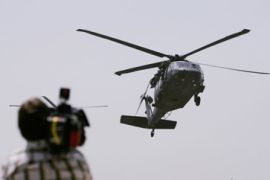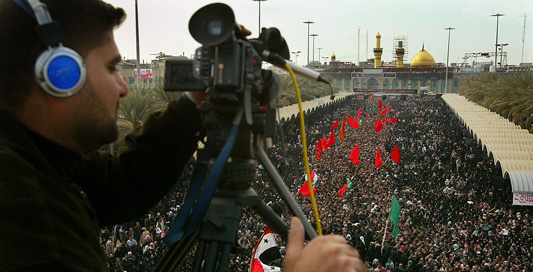Iraq Diary: A filmmaker’s anger
Al Jazeera’s Hoda Abdel-Hamid writes of one man’s efforts to film life in Baghdad.

 |
| A cameraman films an Ashura procession on January 19, 2008. Iraqi film crews and journalists face many funding and security obstacles in Iraq [GALLO/GETTY] |
Imagine shooting a movie on location in Baghdad, in the midst of all the violence and danger.
This is what Bashir al-Majed, an Iraqi filmmaker, has been doing, undeterred by the daily brunt of suicide bombs, kidnapping and killings.
I first met Bashir and other members of the “Dark Film Group” about a year ago when they were rehearsing for a play about an ER doctor in a Baghdad hospital.
Keep reading
list of 4 itemsInside the pressures facing Quebec’s billion-dollar maple syrup industry
‘Accepted in both [worlds]’: Indonesia’s Chinese Muslims prepare for Eid
Photos: Mexico, US, Canada mesmerised by rare total solar eclipse
In the play, the doctor complains that he chose medicine as a career so that he could save lives but that the wanton death from the car bombs has made that goal impossible.
As power outages had become the norm in Baghdad, the members of the Dark Film Group used small white candles as they rehearsed, their shadows casting an ephemeral and sombre mood on the stage.
Ironically, at the time, Bashir explained they chose the word ‘dark’ as part of the troupe’s name because the word reflected their reality as Iraqis.
This year, Bashir looked considerably slimmer, worn down and fatigued by life in Baghdad.
What day is it?
He told me he had just finished editing a nine-minute short film called Personal Calendar.
It all takes place on a minibus, once a preferred target of suicide attacks and drive-by shootings.
“None of the passengers on board agree on which day of the week it is,” he said.
“Like the Iraqi government where the different political blocks disagree about absolutely everything.”
He chose to film a bus full of arguing passengers because it can represent many aspects of an increasingly divided Iraq today.
In between cigarette puffs, Bashir laments that the hidden toll of the past five years is that Iraqi families have become fragmented.
Like the passengers on board the bus.
“My brother is a communist, I am independent and my cousin is an Islamist. We can’t discuss anything at home, because it will end up in a fight or you might offend someone.”
Blast wall impasse
Bashir says that he had planned for the minibus to tour Baghdad and allow him to film a glimpse of daily Baghdad life, raw and unscripted. But this was simply untenable.
“Like traffic, all the blasts walls that surround each neighbourhood made navigating the streets impossible,” he said.
And sectarian ‘sensitivities’ also played a role.
He said: “The crew was mixed Sunni-Shia and Kurd. They are friends but the Sunnis didn’t feel safe driving through Shia areas and vice versa. I was able to film the minibus travelling a distance of 300 metres.”
“Can you imagine? Just 300m in the entire of Iraq.”
In an almost comical, if not bizarre, manner, Bashir shot the bus travelling back and forth on the 300-metre stretch of tarmac under the close protection of the police.
This all has made Bashir very angry. Further adding to his frustrations is the fact he cannot find anyone to finance his films.
He says that his country has fallen apart and that he wants to document this part of Iraqi ideas.
“I will sell my car,” he told me, hoping that will secure some funding.
But he wonders how long the crew, actors and everyone else involved, would be willing to work without earning a living.
“They need to put food on the table too,” he said, taking another frustrated puff of his cigarette.